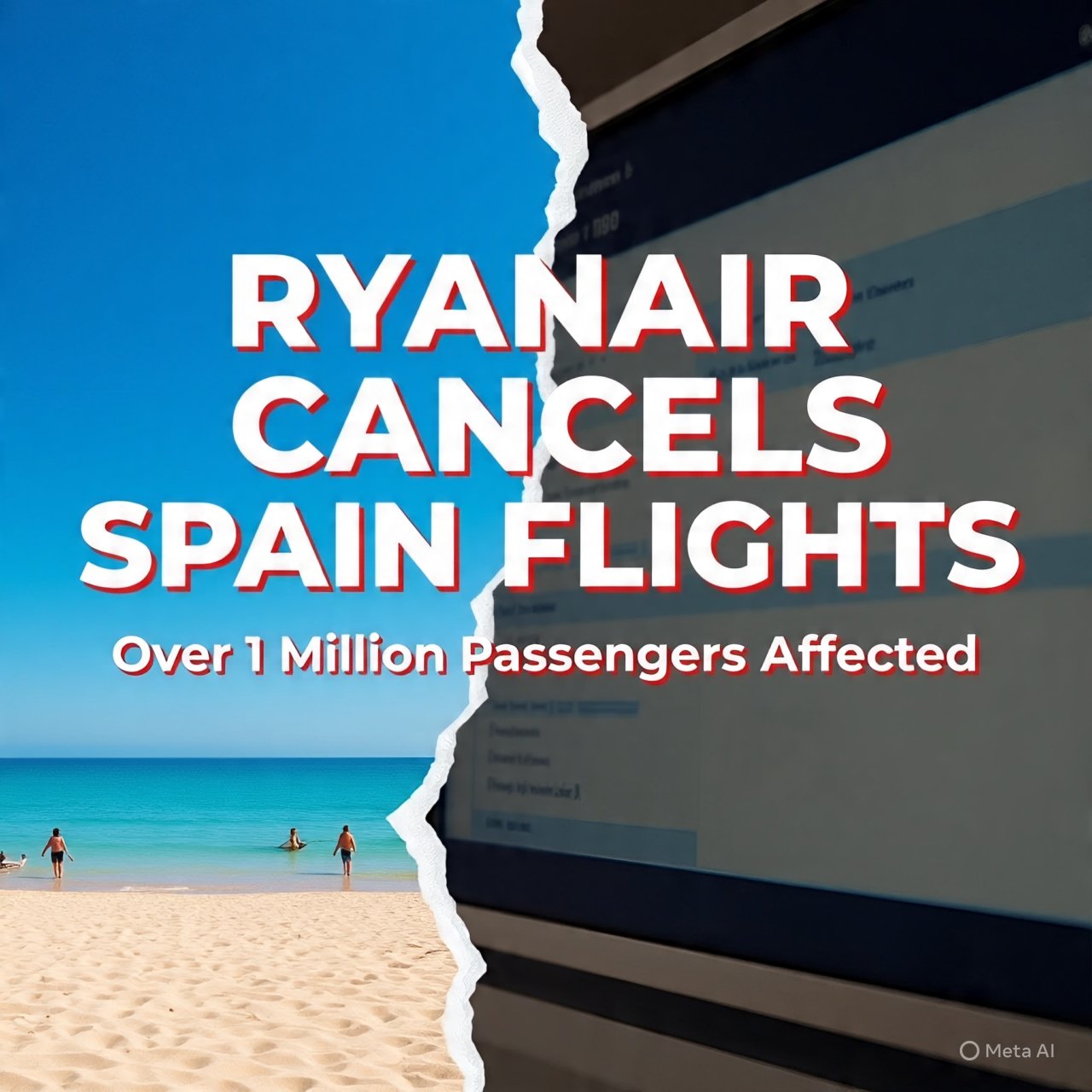In a move sending shockwaves through the European aviation sector, Ryanair, Europe’s largest low-cost carrier, has announced a significant reduction of its flight schedule to and from Spain. The decision to axe numerous routes is set to cause massive travel disruption Spain, impacting the plans of an estimated one million passengers. This drastic measure is not due to a technical or safety issue but is the direct result of a contentious dispute between the airline and Spain’s state-owned airport operator, Aena, over a proposed increase in Spanish airport charges.
For countless travelers who secured low-cost fares for their Spanish holidays or business trips, this news brings a wave of uncertainty and frustration. The cancellations throw carefully laid plans into chaos and raise urgent questions about refunds, re-routing, and compensation. This article will provide a detailed breakdown of the Ryanair cancels Spain flights situation, explore the core of the Ryanair-Aena conflict, explain the far-reaching consequences, and most importantly, offer a clear guide on your passenger rights EU and the steps you should take if your flight is affected.
Table of Contents
The Core of the Conflict: Ryanair vs. Aena’s Airport Charges
At the heart of this large-scale disruption is a fundamental disagreement over money. The conflict pits Ryanair’s ultra-low-cost business model against the financial strategy of Aena, the entity that manages the majority of Spain’s major airports, including hubs in Madrid, Barcelona, and Palma de Mallorca.
The Proposed Fee Hike by Aena
Aena, under the supervision of the Spanish Ministry of Transport, proposed an increase in its airport charges—the fees airlines pay for using airport infrastructure like runways, terminals, and gates. Aena justifies the hike by citing several factors:
- Inflationary Pressures: Rising operational costs across the board.
- Investment in Infrastructure: The need to fund upgrades and modernization projects at Spanish airports to maintain high standards of service and security.
- Post-Pandemic Recovery: Recouping losses incurred during the global travel shutdown and ensuring long-term financial stability.
From Aena’s perspective, this is a necessary adjustment to reflect current economic realities and ensure the sustainability of Spain’s world-class airport network.
Ryanair’s Fierce Opposition
For Ryanair, any increase in operational costs is a direct threat to its core business model, which relies on minimizing expenses to offer the lowest possible fares. The airline has publicly and aggressively opposed the fee increase, arguing that it is counterproductive and harmful.
- Stifling Growth: Ryanair contends that at a time when travel is still recovering, raising charges will stifle demand and hinder the growth of tourism, a cornerstone of the Spanish economy.
- Uncompetitive Practice: The airline claims the move makes Spanish airports less competitive compared to other European destinations that are keeping fees low to attract airlines and passengers.
- Threat to Low Fares: Ultimately, Ryanair argues that such costs would inevitably be passed on to consumers, undermining the very concept of affordable travel.
In response to the unresolved dispute, Ryanair has deployed its most powerful negotiation tactic: cutting capacity. By cancelling flights, the airline not only reduces its own costs but also puts immense pressure on Aena and the Spanish government by directly impacting tourism revenue and passenger convenience.
Unpacking the Impact: Routes, Airports, and Passengers Affected
The decision to implement the Ryanair cancels Spain flights plan has immediate and widespread consequences for the travel network connecting Spain with the rest of Europe.
The Scale of the Disruption
The headline figure of “one million passengers” reflects the sheer volume of seats that will be removed from the market over the coming seasons. This affects a wide range of travelers, from families planning summer holidays on the Costa del Sol to city-breakers heading to Barcelona and commuters on domestic Spanish routes.
The airports feeling the most significant impact include:
- Madrid-Barajas Airport (MAD)
- Barcelona-El Prat Airport (BCN)
- Palma de Mallorca Airport (PMI)
- Airports in the Canary and Balearic Islands, which are heavily reliant on tourism.
The routes being cut are a mix of domestic connections within Spain and popular international routes from key markets like the United Kingdom, Ireland, Germany, and Italy.
Your Rights When Ryanair Cancels Spain Flights: Understanding EU261
If you are one of the passengers affected by these cancellations, it is crucial to understand that you are protected by a powerful piece of legislation: EU Regulation 261/2004. This law establishes clear passenger rights EU in cases of flight disruption.
Introducing EU Regulation 261/2004
EU Regulation 261 is a regulation from the European Commission that applies to any passenger flying from an EU airport or flying into an EU airport on an EU-based airline (like Ryanair). It mandates that airlines provide a certain level of care and compensation to passengers whose travel plans are disrupted.
Your Core Entitlements: Refund or Re-routing
When an airline cancels your flight, EU261 gives you the right to choose one of the following three options:
- A Full Refund: You are entitled to a full refund for the part of the journey that was cancelled, as well as for any other parts of the same booking that are no longer useful (e.g., a connecting flight). The refund must be paid within seven days.
- Re-routing Under Comparable Conditions: The airline must offer you re-routing to your final destination on the next available flight, at no additional cost. This may be on their own services or with another airline if necessary.
- Re-routing at a Later Date: You can also choose to be re-routed at a later date that is convenient for you, subject to seat availability.
The airline must offer you this choice. You are in control of the decision.
The Crucial Question of Flight Cancellation Compensation
In addition to a refund or re-routing, EU261 also provides for monetary flight cancellation compensation. The amount is fixed based on the flight distance:
- €250 for flights up to 1,500 km.
- €400 for flights within the EU over 1,500 km, and for all other flights between 1,500 and 3,500 km.
- €600 for all other flights.
However, there is a critical exception: airlines do not have to pay this compensation if the cancellation was caused by “extraordinary circumstances” which could not have been avoided even if all reasonable measures had been taken.
Ryanair will almost certainly argue that this dispute with Aena constitutes an extraordinary circumstance. However, European regulators and courts have consistently ruled that commercial decisions and disputes, including those with airport authorities, are part of the normal running of an airline’s business and do not typically qualify as “extraordinary.” Therefore, affected passengers have a strong legal case for demanding both a refund/re-routing AND monetary compensation.
The Broader Context: A Familiar Tactic in European Aviation
While the scale of these cuts is immense, the strategy employed by Ryanair is not new. It is a well-documented part of their aggressive business playbook.
Ryanair’s Negotiation Strategy
Threatening to pull services is a powerful lever for budget airlines when negotiating with airports. By demonstrating a willingness to walk away from a market, Ryanair can often extract more favorable terms, lower fees, and better operational conditions. This approach has been used successfully in numerous disputes across Europe and is central to maintaining their ultra-low-cost structure.
This conflict with Aena is a high-profile example of the ongoing tension between budget airlines, who prioritize volume and low costs, and airport operators, who need to maintain and develop expensive infrastructure. The outcome of this dispute will likely set a precedent for future negotiations across the continent.
Summary of Key Points
- Mass Cancellations: Ryanair cancels Spain flights on numerous domestic and international routes due to a dispute over increased Spanish airport charges.
- The Dispute: The conflict is between Ryanair and Spain’s airport operator, Aena, over proposed fee hikes.
- Major Impact: Over a million passenger seats are affected, causing significant travel disruption Spain and impacting the nation’s tourism sector.
- Passenger Rights: Affected travelers are protected by EU Regulation 261, which guarantees the choice of a full refund or re-routing.
- Compensation is Likely Due: Despite the airline’s likely claims, the reason for cancellation (a commercial dispute) generally does not qualify as an “extraordinary circumstance,” meaning passengers should also be eligible for monetary flight cancellation compensation.
Conclusion
The decision by Ryanair to slash its Spanish flight network is a stark reminder of the volatile nature of the European aviation industry. It highlights the delicate balance between the operational needs of airports and the business models of the low-cost carriers that have democratized air travel. For the more than one million passengers caught in the crossfire, the immediate priority is to understand and exercise their rights under EU261. While the dispute between Ryanair and Aena plays out in boardrooms and government offices, it is the individual traveler who bears the brunt of the fallout. This event serves as a crucial case study in passenger rights and the complex economics of modern air travel.
Frequently Asked Questions (FAQ)
1. My Ryanair flight to Spain was cancelled. What is the very first thing I should do?
The first thing you should do is contact Ryanair directly through their website or app. You must officially inform them of your choice: a full refund or re-routing on an alternative flight. Do not simply book a new flight yourself and expect reimbursement without first going through the official process.
2. Am I automatically entitled to monetary compensation for my cancelled Ryanair flight?
You have a very strong claim for compensation under EU Regulation 261. While Ryanair may initially resist paying by claiming “extraordinary circumstances,” a commercial dispute over airport fees is not typically accepted as such a reason by national enforcement bodies or courts. You should formally claim compensation from the airline.
3. What are “extraordinary circumstances” under EU261?
These are events that are not inherent in the normal activity of an airline and are beyond its actual control. Accepted examples include extreme weather, air traffic control strikes, acts of terrorism, or political instability. Airline technical issues and commercial disputes are generally not considered extraordinary.
4. Is there a chance these Ryanair flights to Spain will be reinstated?
Yes, it is possible. This move is widely seen as a negotiation tactic. If Ryanair and Aena can reach a compromise on the Spanish airport charges, the airline could potentially reinstate some or all of the cancelled routes in the future. However, there is no guarantee, and passengers with current bookings should act based on the cancellation notice they have received.
Disclaimer: The information provided in this article is for general informational purposes only and is based on news reports and legal frameworks applicable at the time of writing. Airline policies and the specifics of legal interpretations can change. For definitive advice regarding your specific situation, please consult the airline directly and, if necessary, a national enforcement body or a legal professional specializing in passenger rights.
Affiliate Disclosure: This article may contain affiliate links, which means we may earn a small commission if you click on a link and make a purchase, at no additional cost to you. These commissions help support the maintenance of this site and allow us to continue to create valuable content. We only recommend products and services that we believe in.







